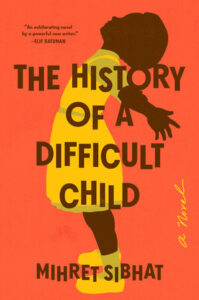
Mihret Sibhat on the Stories Our Names Tell
"When writing, I am reminded that understanding is the path to transformation for all."
My name, like many Ethiopian names, has a story. When I was conceived, my mother had long been suffering from endless bleeding and pain that she later learned were caused by uterine cancer. The bleeding stopped and the pain went away soon after I was born, so she named me Mihret: mercy. She wanted Mihret Ab—God’s mercy—but that was often used for boys, so she opted for the shorter version.
Ethiopians say that names are given to people by angels. No matter how random they may seem at times, names are true descriptions of the bearers’ essence. A preacher at my childhood church disagreed. “Jesus Christ is the only man whose name matches his characteristics!” he declared once. “He is our rescuer, our deliverer, just like his name says.” He told us that none of us lived up to the promises our names held. He turned to Abera, a darker skinned man who sat in the front row and whose name means ‘he lit up’ or ‘shined’. “Look at you, for example,” said the preacher, “what about you says light?”
Abera trembled in laughter, as did most attendees. In hindsight, I feel we should have pushed back; we should have told the preacher that maybe Abera lit up his mother’s life for at least a day or an hour or even a few minutes when he was born and that’s all that matters. Or that maybe our names are mere titles for the stories our parents want to tell about us, and stories don’t lose their truthfulness just because the titles aren’t factual.
No matter how random they may seem at times, names are true descriptions of the bearers’ essence.
My father’s name is one with an elaborate—and hard-to-believe—story. It begins about a century ago, in western Ethiopia, where my grandfather, Sibhat, was working as a secretary and treasurer for a provincial governor. A stranger was sentenced to death for a crime that my father either left out or didn’t know when he told me this. The man’s brother traveled to western Ethiopia from the eastern end, Ogaden, to plead for his life. He met Sibhat and begged him to intervene on his behalf, which my grandfather did. The prisoner wasn’t just spared of death, but was freed. On their way back to the Ogaden, I imagine the brothers expressed their gratitude to God, which is the meaning of Sibhat, so at least on this account, the angels were very much on the nose.
Several years later, my grandfather moved to my home province to work for another governor. In 1935, Italy invaded Ethiopia for the second time while he was in the countryside collecting taxes. His governor declared a ‘kitet’—a decree ordering all able bodied men to rise and rush to the defense of their homeland. Before he left with his army, the governor left a message for Sibhat: you are to stay here and administer the region in my absence. My grandfather was outraged when he received the message: I am not guarding the house as if I were a woman! He took off after the army immediately and, on his way, came across many men who were returning to their villages, having made up excuses for why they couldn’t fight. Sibhat caught up with his governor’s army, which was headed to the Ogaden front in eastern Ethiopia.
The governor was livid that my grandfather had disobeyed his orders to stay behind. But he didn’t have the luxury of anger, so he made Sibhat the treasurer of his army and continued the march. In Ogaden, the army faced an unusually cruel enemy. Italy, having been subjected to humiliation at the Battle of Adwa four decades earlier, had come back with a vengeance. The invaders deployed poison gas and weapons Ethiopians had never seen before.
My grandfather was left for crows: wounded by a shot, unable to move, abandoned by comrades who saw no point in losing their own lives trying to save his. The army was decimated, and their leader, my grandfather’s governor, Ethiopia’s future first Prime Minister, joined the Emperor on the train to Djibouti, before they all fled to England. Soldiers who made it back to my home province told my grandmother that Sibhat was dead. She shaved her head, wore black, and went through weeks of a mourning ritual.
Meanwhile, back in the Ogaden, nearby townspeople went out to the battlefield to survey the damage and bury the dead. As they went around looking at the bodies, one of the men came upon a wounded soldier under a tree, waiting for God to take back his last breath. The man bent over, looked at the soldier intently and said, “Are you not Sibhat Zeleke?” The soldier was silent. “Are you not the man who helped free my brother?”
The man carried my grandfather to his home, tended to his wounds, fed him, and nursed him for three months. And when my grandfather regained his strength, he put him on the back of a mule and sent him back to his home. My grandmother was wearing black when Sibhat arrived. A year later, my father was born. His name? Melesse: he brought [him] back. With magical powers that radiated out of him even before his conception, my father reached out to this world from beyond to snatch his father out of the jaws of death.
One of my professors used to say that we are only allowed one coincidence in a fictional story. I feel this coincidence involving my grandfather is too grand in nature, too vast in geography, too perfect a story to even put in an essay without offering disclaimers. My grandfather did in fact return from the war with injuries months later. He did work for a governor in the west. He was also the sort of man who often got in trouble with his superiors for disobeying them to the benefit of strangers. So I do not doubt most of the story; it is just the bit about him being saved by a man he had helped years earlier—a miracle of biblical proportions—that I struggle to believe.
Maybe our names and the hopeful stories accompanying them are mere guardrails intended to keep us on the right side of our inner struggles.
Despite his pride in his father’s accomplishments—and maybe because of it—my father didn’t feel as powerful as the story of his name suggests. He felt more like a supporting act, a trumpeter announcing the arrival of a hero, or a mere conclusion. When I was filling out a form for a visa before I left Ethiopia, I asked my father what I should put down as my last name because we do not use surnames. We have a first name followed by our father’s first name and so on. “Use Sibhat,” said my father, “he deserves to be known.” Even decades after my grandfather’s death, my father diminished his role in his father’s return by disappearing himself from his own daughter’s name.
Maybe the question shouldn’t be who is right—the angels or the preacher? Both positions, taken together, appear to be pointing to the bigger and obvious truth that people are “large and contain multitudes.” Maybe our names and the hopeful stories accompanying them are mere guardrails intended to keep us on the right side of our inner struggles.
In my case, it would have been more accurate to name me Coincidence because my mother’s pain and bleeding came back months after my birth. But mercy was the story that she wanted to see unfold, instead of a name that reflected back the fact of her circumstances. She must have felt triumphant after making a whole child, a life affirming creature, inside a tattered uterus, forcing life and death to sit side by side for nine months without contradicting each other. It wasn’t far-fetched to imagine mercy lurking close by. Hope’s intangibility doesn’t make it any less true than an illness.
Still, I am the least merciful person I know, so it is funny to me that my name is mercy. Sometimes my assessment of people’s actions is so harsh that I avoid them afraid of what my words might do to them if I said what I think.
On the other hand, one reason for my love of writing, especially fiction, is that it gives me a chance to consider mercy, both for myself and others. In the pages of my stories, the people who hurt me in real life are harmless. I am offered a safe space to get to know my enemies, often finding that, once you go behind their lines and see how they live or once lived, it is hard not to love them. This doesn’t mean making excuses for abusive behavior or handing out blanket exoneration. What I mean is: when writing, I am reminded that understanding is the path to transformation for all, and transformation is the path to lasting justice, which is another name for truth, which in turn is reached through the willingness to exercise mercy.
It makes me angry to think about the inevitable future in which I put my current enemies in a story, get to know them, and end up forgiving them. I want to keep hating them because they have hurt me. But I love writing fiction and the best thing it does is disarm me. Perhaps my name has little to do with my mother’s cancer. Perhaps she, who was named Mulatwa, the fulfillment, was just a prophet who foresaw my eventual pursuit of a career in fiction, in this art of laboring to see all the sides, this art of mercy, of a desperate need to prove to yourself that even the most wretched people are lovable at some level, thereby giving yourself the courage to face the wretched parts of you.
__________________________________

The History of a Difficult Child by Mihret Sibhat is available from Viking.
Mihret Sibhat
Mihret Sibhat was born and raised in a small town in western Ethiopia before moving to California when she was seventeen. A graduate of California State University, Northridge, and the University of Minnesota’s MFA program, she was a 2019 A Public Space Fellow and a 2019 Minnesota State Arts Board Artist Initiative grantee. In a previous life, she was a waitress, a nanny, an occasional shoe shiner, a propagandist, and a terrible gospel singer. She’s currently a miserable Arsenal fan.



















